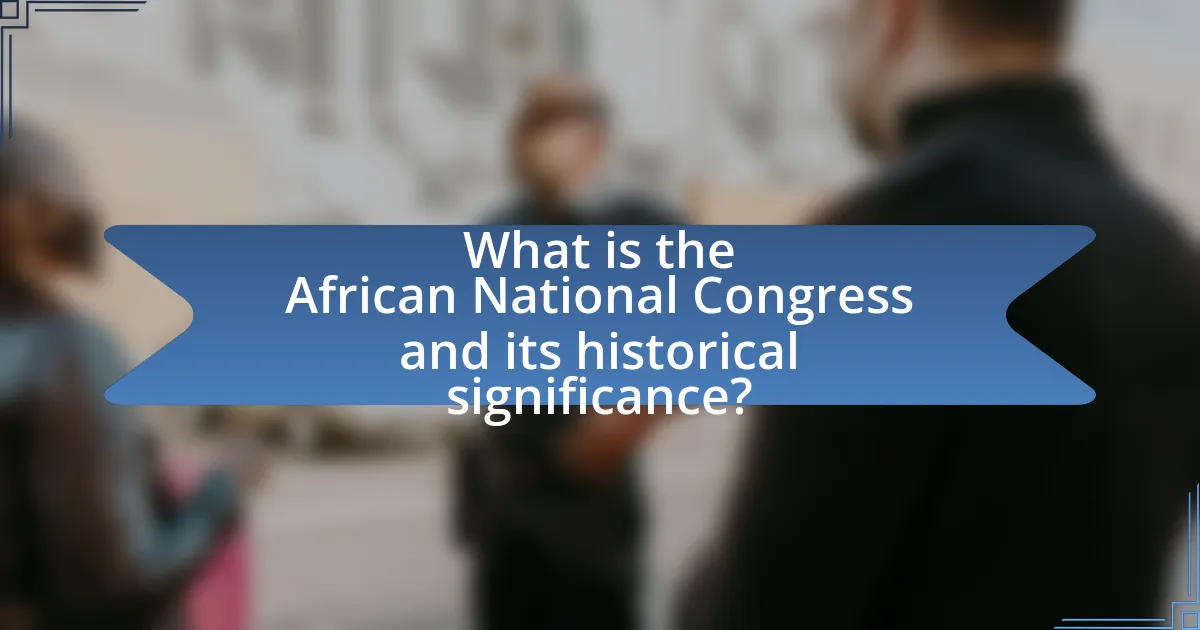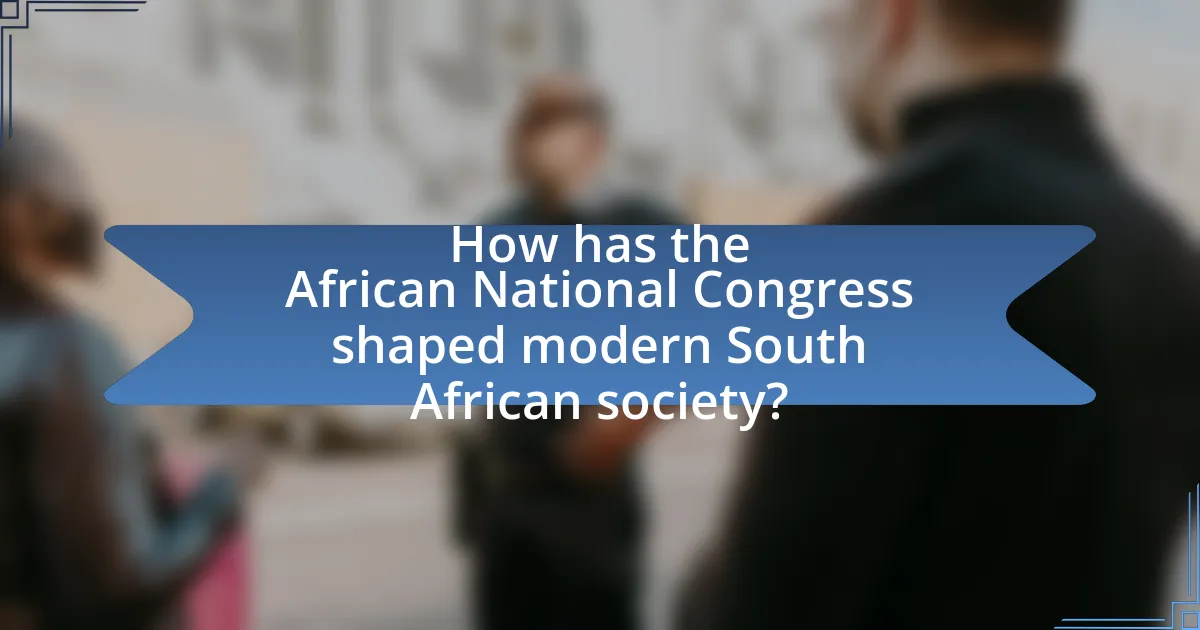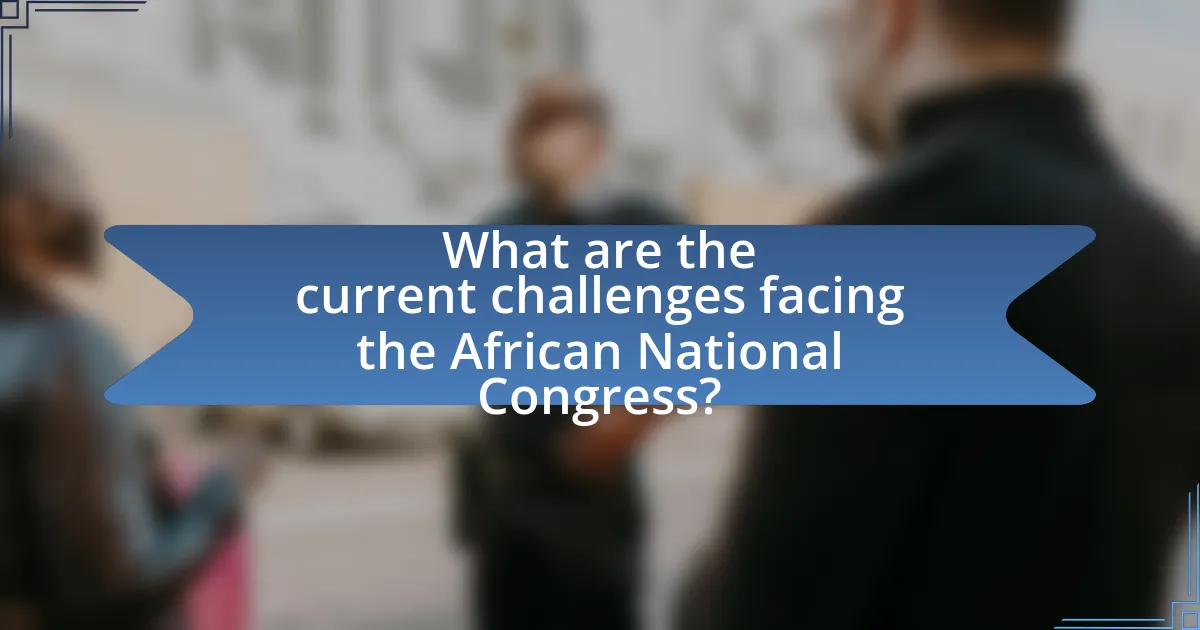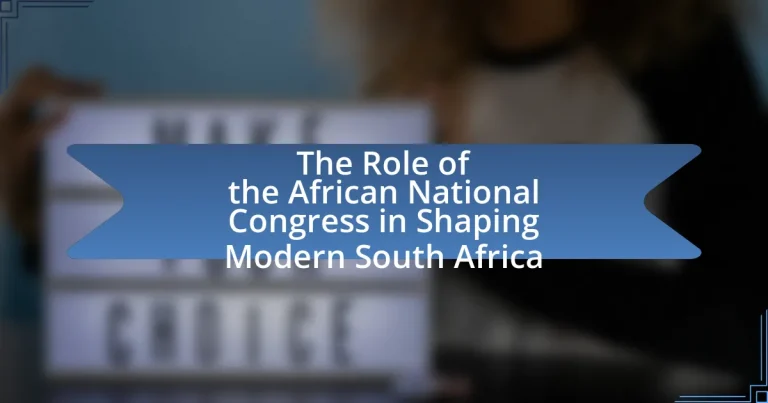The African National Congress (ANC) is a pivotal political party in South Africa, recognized for its significant role in the anti-apartheid movement and the establishment of a democratic government. Founded in 1912, the ANC evolved from advocating for African rights to leading the struggle against institutionalized racial segregation, culminating in Nelson Mandela’s election as the first black president in 1994. This article examines the ANC’s emergence as a political force, its strategies in mobilizing support against apartheid, and its impact on South Africa’s transition to democracy. Additionally, it addresses the ANC’s policies post-1994, the challenges it faces today, and its influence on national identity and governance in modern South Africa.

What is the African National Congress and its historical significance?
The African National Congress (ANC) is a political party in South Africa that played a crucial role in the struggle against apartheid and the establishment of a democratic government. Founded in 1912, the ANC initially aimed to unite African people and promote their rights, but it became a leading force in the anti-apartheid movement, particularly after the formation of the ANC Youth League in 1944, which advocated for more radical approaches. The historical significance of the ANC is underscored by its leadership in the liberation struggle, culminating in the election of Nelson Mandela as South Africa’s first black president in 1994, marking the end of decades of institutionalized racial segregation. The ANC’s efforts not only transformed South Africa’s political landscape but also inspired global movements for justice and equality.
How did the African National Congress emerge as a political force?
The African National Congress (ANC) emerged as a political force primarily through its formation in 1912, aimed at uniting African people against racial discrimination and advocating for their rights. The ANC gained momentum in the 1940s and 1950s by adopting more radical strategies, including the Defiance Campaign in 1944, which mobilized mass protests against apartheid laws. The organization’s political significance was further solidified by its leadership role in the anti-apartheid movement, particularly during the 1960s, when it became a symbol of resistance against the oppressive regime. The ANC’s establishment of the armed wing, Umkhonto we Sizwe, in 1961 marked a pivotal shift towards armed struggle, enhancing its visibility and support among oppressed communities. The ANC’s eventual negotiation for a democratic South Africa in the early 1990s culminated in its electoral victory in 1994, establishing it as a dominant political force in the country.
What were the key events leading to the formation of the African National Congress?
The key events leading to the formation of the African National Congress (ANC) include the establishment of the South African Native National Congress in 1912, which aimed to unite African people against racial discrimination. This was prompted by the 1910 Union of South Africa, which institutionalized racial segregation and disenfranchised black South Africans. The formation of the ANC was also influenced by the rise of African nationalism and the need for a coordinated response to oppressive policies, such as the Natives Land Act of 1913, which restricted land ownership for black South Africans. These events collectively galvanized African leaders to create a political organization that would advocate for the rights and freedoms of black South Africans, ultimately leading to the ANC’s establishment as a formal political entity.
Who were the founding members and what were their motivations?
The founding members of the African National Congress (ANC) included John Langalibalele Dube, Walter Sisulu, and Nelson Mandela, among others. Their motivations centered around the fight against racial discrimination and the pursuit of equal rights for all South Africans, particularly in response to the oppressive policies of the apartheid regime. The ANC aimed to unite various racial and ethnic groups to advocate for political and social change, emphasizing the need for a democratic society where all citizens could participate equally in governance.
What role did the African National Congress play in the anti-apartheid movement?
The African National Congress (ANC) was the leading organization in the anti-apartheid movement, advocating for the end of racial segregation and discrimination in South Africa. Founded in 1912, the ANC mobilized mass protests, strikes, and international campaigns to challenge the apartheid regime. Key events, such as the Defiance Campaign in 1952 and the Sharpeville Massacre in 1960, highlighted the ANC’s commitment to nonviolent resistance and later armed struggle through its military wing, Umkhonto we Sizwe, established in 1961. The ANC’s efforts garnered global support, leading to economic sanctions against South Africa and ultimately contributing to the dismantling of apartheid in the early 1990s. The organization’s leadership, including figures like Nelson Mandela, played a crucial role in negotiating the transition to a democratic South Africa, solidifying the ANC’s position as a central force in the country’s history.
How did the ANC mobilize support against apartheid?
The African National Congress (ANC) mobilized support against apartheid through grassroots organizing, mass protests, and international advocacy. The ANC established a network of local branches that engaged communities, educating them about their rights and the injustices of apartheid. Notably, the Defiance Campaign of 1952 marked a significant mobilization effort, where thousands participated in acts of civil disobedience against discriminatory laws. Additionally, the ANC formed alliances with labor unions and other anti-apartheid organizations, amplifying their reach and impact. Internationally, the ANC sought support from foreign governments and organizations, leading to sanctions against the apartheid regime, which further galvanized domestic and global opposition to apartheid policies.
What strategies did the ANC employ to challenge the apartheid regime?
The African National Congress (ANC) employed various strategies to challenge the apartheid regime, including armed resistance, mass mobilization, and international advocacy. The ANC initiated armed struggle through the formation of Umkhonto we Sizwe in 1961, which conducted sabotage against government installations. Additionally, the ANC organized mass protests, strikes, and campaigns, such as the Defiance Campaign in 1952, to galvanize public support and raise awareness against apartheid laws. Furthermore, the ANC sought international support by appealing to global organizations and foreign governments, which led to economic sanctions and diplomatic pressure on the apartheid government. These strategies collectively contributed to the eventual dismantling of apartheid in the early 1990s.
What impact did the African National Congress have on South Africa’s transition to democracy?
The African National Congress (ANC) played a crucial role in South Africa’s transition to democracy by leading the struggle against apartheid and advocating for inclusive governance. The ANC’s efforts culminated in the end of apartheid in 1994, marked by the first multiracial elections, where Nelson Mandela was elected as the first Black president. The ANC’s negotiation strategies, particularly during the Convention for a Democratic South Africa (CODESA), facilitated dialogue between various political factions, ensuring a peaceful transition. Additionally, the ANC’s commitment to human rights and social justice was enshrined in the new Constitution, which is regarded as one of the most progressive in the world.
How did the ANC influence the drafting of the new South African Constitution?
The African National Congress (ANC) significantly influenced the drafting of the new South African Constitution by advocating for a framework that emphasized human rights, equality, and democracy. The ANC’s participation in the constitutional negotiations, particularly through the Convention for a Democratic South Africa (CODESA), ensured that the principles of non-racialism and social justice were central to the document. The final Constitution, adopted in 1996, reflects the ANC’s commitment to dismantling apartheid’s legacy, as evidenced by its inclusion of a Bill of Rights that guarantees fundamental freedoms and protections for all citizens.
What were the key milestones in the ANC’s journey to power?
The key milestones in the African National Congress’s (ANC) journey to power include the formation of the ANC in 1912, the adoption of the Freedom Charter in 1955, the Sharpeville Massacre in 1960, the establishment of armed struggle through Umkhonto we Sizwe in 1961, the unbanning of the ANC in 1990, and the first democratic elections in 1994. The ANC was founded to unite Africans against racial discrimination and promote their rights. The Freedom Charter articulated the aspirations of the South African people for a non-racial, democratic society. The Sharpeville Massacre galvanized international opposition to apartheid, while the armed struggle marked a shift in the ANC’s tactics. The unbanning of the ANC allowed for negotiations to end apartheid, culminating in the historic 1994 elections, where Nelson Mandela became the first black president of South Africa.

How has the African National Congress shaped modern South African society?
The African National Congress (ANC) has significantly shaped modern South African society by leading the struggle against apartheid and establishing a democratic government. The ANC’s efforts culminated in the end of institutionalized racial segregation in 1994, when Nelson Mandela became the first Black president of South Africa. This transition marked a pivotal moment in the nation’s history, promoting policies aimed at reconciliation, social justice, and economic transformation. The ANC’s implementation of the Reconstruction and Development Programme (RDP) sought to address the socio-economic disparities created by apartheid, focusing on housing, education, and healthcare. Furthermore, the ANC’s commitment to a constitutional democracy has fostered a legal framework that upholds human rights and promotes equality, as evidenced by the South African Constitution, which is regarded as one of the most progressive in the world.
What policies has the African National Congress implemented since coming to power?
The African National Congress (ANC) has implemented several key policies since coming to power in 1994, focusing on social justice, economic transformation, and nation-building. Notable policies include the Reconstruction and Development Programme (RDP), which aimed to address poverty and inequality through housing, education, and healthcare initiatives. The ANC also introduced the Growth, Employment and Redistribution (GEAR) strategy in 1996, which sought to stimulate economic growth and create jobs while promoting fiscal discipline. Additionally, the ANC has prioritized land reform policies to redress historical injustices related to land ownership. These policies reflect the ANC’s commitment to transforming South Africa into a more equitable society, as evidenced by the significant increase in access to basic services and education for previously marginalized communities.
How have these policies addressed social and economic inequalities?
The policies implemented by the African National Congress (ANC) have aimed to reduce social and economic inequalities by promoting land reform, improving access to education, and enhancing social welfare programs. For instance, the ANC’s land reform initiatives seek to redistribute land to previously disadvantaged communities, addressing historical injustices and economic disparities. Additionally, the introduction of policies such as the National Development Plan has focused on increasing educational opportunities and skills development for marginalized groups, which is crucial for economic empowerment. According to the World Bank, these efforts have contributed to a gradual decrease in poverty levels, with the poverty rate dropping from 30% in 2006 to 18% in 2021, indicating progress in addressing economic inequalities.
What challenges has the ANC faced in policy implementation?
The African National Congress (ANC) has faced significant challenges in policy implementation, primarily due to issues such as corruption, lack of capacity, and internal divisions. Corruption within the party has undermined public trust and diverted resources away from essential services, as evidenced by numerous scandals involving high-ranking officials. Additionally, the ANC has struggled with a lack of administrative capacity, which hampers effective execution of policies, particularly in areas like education and healthcare. Internal divisions within the party further complicate consensus on policy direction, leading to inconsistent implementation and a failure to address pressing socio-economic issues. These factors collectively hinder the ANC’s ability to fulfill its policy objectives and meet the needs of South African citizens.
How has the African National Congress influenced national identity in South Africa?
The African National Congress (ANC) has significantly influenced national identity in South Africa by promoting a vision of a unified, democratic nation that transcends racial and ethnic divisions. The ANC’s struggle against apartheid, particularly through the leadership of figures like Nelson Mandela, fostered a sense of shared identity among diverse South African communities, emphasizing equality and human rights. The establishment of a democratic government in 1994, led by the ANC, marked a pivotal moment in redefining national identity, as it symbolized the end of institutionalized racism and the beginning of a new era focused on inclusivity and reconciliation. The ANC’s policies and rhetoric have consistently reinforced the idea of “Ubuntu,” which emphasizes communal values and interconnectedness, further shaping the national consciousness towards unity and collective progress.
What role does the ANC play in promoting unity among diverse communities?
The African National Congress (ANC) plays a crucial role in promoting unity among diverse communities in South Africa by advocating for inclusivity and social cohesion. The ANC’s policies and programs, such as the National Development Plan, emphasize the importance of building a united nation that respects cultural diversity while fostering a shared national identity. Historical efforts, including the Truth and Reconciliation Commission, aimed to heal divisions from apartheid, demonstrating the ANC’s commitment to reconciliation and unity. Additionally, the ANC’s leadership in various community outreach initiatives seeks to bridge gaps between different ethnic and cultural groups, reinforcing its role as a unifying force in a multicultural society.
How has the ANC’s narrative shaped public perception of history?
The African National Congress (ANC) has significantly shaped public perception of history by promoting a narrative that emphasizes its role in the struggle against apartheid and the establishment of a democratic South Africa. This narrative frames the ANC as the primary liberator of the nation, highlighting key events such as the 1994 elections, which marked the end of apartheid and the beginning of a new era. The ANC’s portrayal of historical events often focuses on themes of resilience, unity, and the moral imperative of liberation, which resonate with many South Africans and foster a sense of national identity.
For instance, the ANC’s educational programs and public commemorations, such as the annual celebration of Freedom Day, reinforce this narrative by celebrating the sacrifices made by its leaders and supporters. This has led to a widespread acceptance of the ANC’s version of history, often overshadowing alternative perspectives or critiques of its governance. Consequently, the ANC’s narrative has not only influenced how history is taught in schools but also shaped the collective memory of the nation, impacting public discourse and political engagement in contemporary South Africa.

What are the current challenges facing the African National Congress?
The African National Congress (ANC) currently faces significant challenges, including internal divisions, declining electoral support, and issues of corruption. Internal divisions have led to factionalism within the party, undermining its unity and effectiveness. For instance, the ANC’s performance in the 2021 local elections showed a decline, with the party securing only 46% of the vote, down from 54% in 2016, indicating a loss of public confidence. Additionally, corruption scandals, such as those involving former President Jacob Zuma, have tarnished the party’s reputation and eroded trust among its constituents. These challenges threaten the ANC’s ability to maintain its historical role as a leading force in South African politics.
How has internal conflict affected the African National Congress’s effectiveness?
Internal conflict has significantly undermined the effectiveness of the African National Congress (ANC) by creating divisions that hinder decision-making and policy implementation. For instance, factionalism within the party has led to power struggles, which have distracted leadership from addressing pressing national issues, such as economic inequality and corruption. The ANC’s declining electoral support, evidenced by losing major municipalities in the 2016 local elections, illustrates the detrimental impact of these internal conflicts on its ability to govern effectively. Furthermore, the party’s internal disputes have eroded public trust, as seen in the increasing disillusionment among voters, which further complicates its capacity to fulfill its mandate in shaping modern South Africa.
What are the main factions within the ANC and their differing ideologies?
The main factions within the African National Congress (ANC) are the ANC Youth League, the ANC Women’s League, and the ANC Veterans League, each representing differing ideologies. The ANC Youth League advocates for radical economic transformation and youth empowerment, emphasizing the need for policies that address inequality and unemployment. The ANC Women’s League focuses on gender equality and women’s rights, promoting policies that enhance women’s participation in politics and the economy. The ANC Veterans League represents the interests of former combatants and emphasizes the importance of historical memory and recognition of their contributions to the struggle against apartheid. These factions reflect the diverse perspectives within the ANC, influencing its policies and strategies in shaping modern South Africa.
How do leadership changes impact the ANC’s direction?
Leadership changes significantly impact the African National Congress’s (ANC) direction by altering its strategic priorities and policy focus. For instance, the transition from Jacob Zuma to Cyril Ramaphosa in 2018 marked a shift towards anti-corruption measures and economic reform, reflecting Ramaphosa’s commitment to revitalizing the party’s image and governance. This change was evident in the ANC’s renewed emphasis on transparency and accountability, as seen in the establishment of the Zondo Commission to investigate state capture. Such leadership transitions can reshape the ANC’s approach to issues like land reform, economic inequality, and social justice, influencing both party unity and electoral performance.
What external factors are influencing the African National Congress today?
The African National Congress is currently influenced by several external factors, including economic conditions, international relations, and global political trends. Economic challenges, such as high unemployment rates and inflation, impact the party’s policies and public perception. Additionally, the ANC’s relationships with foreign governments and international organizations shape its strategic decisions, particularly regarding trade and investment. Global political trends, such as the rise of populism and shifts in democratic norms, also affect the ANC’s approach to governance and its electoral strategies. These factors collectively inform the ANC’s responses to both domestic and international challenges.
How do economic conditions affect the ANC’s popularity and governance?
Economic conditions significantly impact the African National Congress’s (ANC) popularity and governance by influencing public perception and voter behavior. When economic growth is strong, the ANC tends to enjoy higher approval ratings, as citizens associate the party with positive outcomes such as job creation and improved living standards. Conversely, during periods of economic downturn, characterized by high unemployment rates and inflation, the ANC’s popularity often declines, leading to increased criticism of its governance and policies. For instance, South Africa’s unemployment rate reached 34% in 2021, contributing to a drop in the ANC’s support in subsequent elections, as voters expressed dissatisfaction with the party’s handling of economic challenges. This correlation between economic performance and political support underscores the importance of effective governance in maintaining the ANC’s legitimacy and authority in South Africa.
What role does international perception play in the ANC’s current challenges?
International perception significantly impacts the African National Congress (ANC) by influencing its political legitimacy and effectiveness in addressing domestic challenges. The ANC faces scrutiny from global observers regarding its governance, economic policies, and human rights record, which can lead to diminished foreign investment and aid. For instance, reports from organizations like Human Rights Watch and Transparency International highlight concerns over corruption and governance issues within the ANC, affecting its international standing. This negative perception can exacerbate the party’s internal challenges, as it struggles to maintain support among constituents who are increasingly aware of global critiques.
What can be learned from the African National Congress’s journey in shaping modern South Africa?
The African National Congress (ANC) exemplifies the importance of resilience and strategic leadership in the fight against systemic oppression, which has significantly shaped modern South Africa. The ANC’s journey from its formation in 1912 to its role in dismantling apartheid in the 1990s highlights the effectiveness of organized resistance and grassroots mobilization. For instance, the ANC’s adoption of the Freedom Charter in 1955 laid the foundation for a democratic South Africa, emphasizing equality and human rights. Furthermore, the ANC’s ability to negotiate with the apartheid government, culminating in the 1994 elections, demonstrates the power of dialogue and compromise in achieving political change. These lessons underscore the significance of unity, strategic planning, and the pursuit of justice in shaping a nation’s future.
What best practices can be identified from the ANC’s approach to governance?
The best practices identified from the ANC’s approach to governance include a commitment to inclusivity, transparency, and accountability. The ANC has emphasized the importance of involving diverse communities in decision-making processes, which fosters a sense of ownership and participation among citizens. For instance, the establishment of public consultations and community forums has allowed for direct engagement between government officials and the populace, enhancing transparency in governance. Additionally, the ANC has implemented measures to combat corruption, such as the establishment of the Public Protector’s office, which serves to hold public officials accountable for their actions. These practices have contributed to a more democratic and responsive governance framework in South Africa.
How can the ANC’s experiences inform future political movements in South Africa?
The African National Congress (ANC) can inform future political movements in South Africa by providing lessons on grassroots mobilization, coalition-building, and the importance of a clear ideological framework. The ANC’s successful anti-apartheid struggle demonstrated the effectiveness of uniting diverse groups under a common cause, as seen in the formation of the Congress of the People in 1955, which brought together various organizations and communities. Additionally, the ANC’s experience with negotiation and compromise during the transition to democracy in the early 1990s highlights the necessity of dialogue and collaboration among political factions to achieve lasting change. Furthermore, the ANC’s challenges with governance and internal divisions post-1994 serve as a cautionary tale for future movements about the risks of losing focus on foundational principles and the need for accountability.


